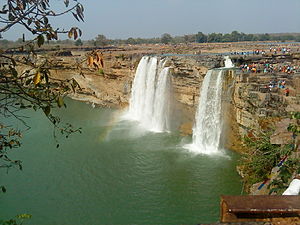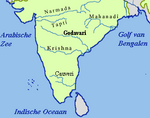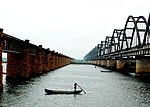|
Indravati River
Indravati River is a tributary of the Godavari River, in central India. The Indravati River is a stream of the river Godavari. Its starting point, found to be the Ghats of Dandakaranya, ranges from a hilltop village Mardiguda of Thuamula Rampur Block in the Kalahandi district of the state of Odisha. Due to the amalgamation of three streams, the River follows a westerly path and enters Jagadalpur in the state of Chhattisgarh. The river moves from here in a southern route, before eventually uniting with the Godavari at the borders of three states. They are the states of Chhattisgarh, Maharashtra and Telangana. The river at a variety of stages of its course forms the boundary between Chhattisgarh and Maharashtra. The river Indravati is also known as the oxygen of the Bastar district of the state of Chhattisgarh. This district is one of the greenest and eco-friendly districts, found in the whole of India. A total number of five hydroelectric projects were planned on the river Indravati. They were namely the Kutru I, the Kutro II, the Nugru I, Nugru II and the Bhopalpatnam. However, the plan misfired and did not see the light of the day due to ecological reasons. The Indravati is sometimes known as the "lifeline" of the Kalahandi, Nabarangapur, of Odisha & Bastar districts of Chhattisgarh, one of the greenest districts in India. Most of the river's course is through the dense forests of Nabarangapur & Bastar. The river flows for 535 kilometres (332 mi) and has a drainage area of 41,665 square kilometres (16,087 sq mi). Mythology behind origin of SourceThere is a Hindu mythological story behind the formation of Indravati River. Once upon a time the place was full of Champa and Chandan trees, which fragranced the whole forest. Due to such a beautiful place on earth, Lord Indra and Indrani went down from Heaven to stay here for a while. They deeply enjoyed the beauty of nature; while wandering in the jungle Indra went to a small village Sunabeda (Nuapada district), where he met with a beautiful girl Udanti. At first meet, they fall in love with each other; and Indra disagreed to get back. On other side, due to disband or separation Indrani cried sorrowfully and expressed her pain to the people, who gathered there. People knew well about the Indra and Udanti; they informed the same to Indrani and suggested to stay there. Indrani got irate over Indra and pour scorn on Indra and Udanti so that they never meet again and she stayed there as Indravati River, which flows till date. And, Indra and Udanti rivers are also flowing there separately, without meeting each other due to offense of Indrani. Source and flowThe river Indravati rises at an elevation of 914 metres (2,999 ft) in the Kalahandi district of Odisha on the western slopes of the Eastern Ghats. It flows west-ward through the Kalahandi, Nabarangapur and Koraput districts for 164 kilometres (102 mi) and after forming the boundary between Odisha and Chhattisgarh states for 9.5 kilometres (5.9 mi), enters the Bastar district of Chhattisgarh. After flowing 233 kilometres (145 mi) in Chhattisgarh, it turns south and flows along the boundary of Chhattisgarh and Maharashtra for about 129 kilometres (80 mi) and joins Godavari River at the junction of the boundaries of Maharashtra, Chhattisgarh and Telangana states.[1] The Indravati sub-basin covers a total area of about 40,625 square kilometres (15,685 sq mi). Indravati has a catchment area of 7,435 square kilometres (2,871 sq mi) in Odisha. The length of river is about 535.80 kilometres (332.93 mi), and starting from the hills of Kalahandi, it joins the Godavari river near village Bhadrakali in Bijapur district of Chhattisgarh.[2] It has a well-defined course from its origin to its confluence with the Godavari River. Starting in a south-east direction as a small rivulet in Odisha, it later runs in the western direction through Bastar district of Chhattisgarh until it is deflected and runs north-west and then again takes a turn to the south-west. During its total course of 535.80 kilometres (332.93 mi) the river drops by 832.10 metres (2,730.0 ft). Its bed level at its junction with the Godavari River is of the order of R.L. 82.3 m compared to the level of 914.4m in Kalahandi from where it takes off. Indravati and Sabari are interconnected naturally in Odisha area. Indravati waters overflow into the Sabari through Jaura Nallah during floods.. TributariesThe major tributaries of river Indravati[3] are Keshadhara Nalla, Kandabindha Nallah, Chandragiri Nalla, Golagar Nalla, Poragarh Nalla, Kapur Nallah, Muran River, Bangiri Nallah, Telengi Nallah, Parlijori Nallah, Turi Nallah, Chourijori Nallah, Damayanti Sayarh, Kora river, Modang river, Padrikundijori river, Jaura river and Bhaskel river. The important right bank tributaries of the Indravati are Bhaskel, Boarding, Narangi, Nimbra (Parlkota), Kotri and Bandia. The important left bank tributary is Nandiraj. Indravati Dam Indravati Dam or Upper Indravati Hydro Power Project built near Mukhiguda, Kalahandi is one of the largest Dam in India as well as Asia. It is the largest dam in eastern India which produces 600MW of electricity. The Upper Indravati Project envisages diversion of the water of the Indravati river in its upper reaches into the Mahanadi valley for power generation and irrigation. Other Dam proposalsA total of five hydroelectric projects (Kutru I, Kutru II, Nugur I, Nugur II and Bhopalpatnam) were planned on the stretch of Indravati River at various points in time. But none could see the light of the day due to ecological concerns raised in various fora. According to Interstate Agreement as per Godavari Water Disputes Tribunal (GWDT) Report, the State of Odisha has to ensure 1.3×109 cubic metres (45,000×106 cu ft) (45 TMC) of water at the Odisha–Chhattisgarh border.[1] EcologyThe Chitrakoot Falls are located 40 kilometres (25 mi) from Jagdalpur, in Chhattisgarh. Indravati National Park and Tiger Reserves are located in the adjoining region of Chhattisgarh state. The Chitrakot fall is almost at the point of its extinct because of indiscriminate construction of check dams near the fall. Social Activists and environmentalists are hell bent on getting the charm of the fall back. Now the fall is worth viewing during the rainy seasons only. See alsoReferences
External linksWikivoyage has a travel guide for Eastern India.
|
||||||||||||||||||||||||||||||||||||||||||





